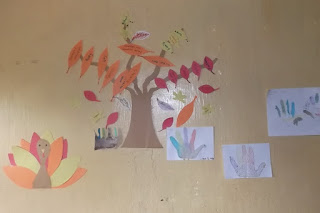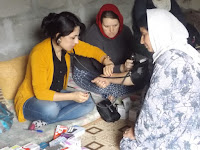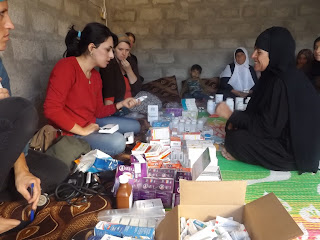Two years ago we took the boys (and an 8-month baby bump) to the beach in Mwanza. We had a great time playing at the beach on Christmas and Boxing Day, and ate hotel food for Christmas dinner.
This year we had planned to go back to Mwanza to play on the beach and in a swimming pool, but Fred and I have been traveling so much lately that staying in yet another ubiquitous hotel room didn't sound all that appealing, so we decided to save money and stay home. Then God moved us to spend that money on food for some of the families we've been interacting with this past year. We bought 50 kilos of rice, 25 kilos of sugar, and 10 1-liter bottles of oil. I baked a bunch of Christmas cookies and made little cards and wrapped up a bag of cookies for each family. Our friend Stephen and our house helper, Adera, split up the food into eight portions, and on Christmas Day Stephen, Fred and Wesley delivered the packages.
 First they visited Grace and Pita and Pita's kids, who received a water system at their home from the Ryding family earlier this year. They found the family walking back from church. Fred asked Pita, the blind daughter, what she was hoping to eat for Christmas. "Rice, but we don't have any," she replied. They got the joy of making her modest Christmas wish come true.
First they visited Grace and Pita and Pita's kids, who received a water system at their home from the Ryding family earlier this year. They found the family walking back from church. Fred asked Pita, the blind daughter, what she was hoping to eat for Christmas. "Rice, but we don't have any," she replied. They got the joy of making her modest Christmas wish come true.
Some of the homes they were going to were off-road, to say the least! Wesley told Fred "This isn't a safe place to drive!" The next home was of a family which had received a new house from Shantz Mennonite Church. The HIV+ single mother who was the intended beneficiary of the house died the day before the Shantz team was to build the house, so instead they gave money to build a new home for the orphaned children later on.

When Fred, Stephen and Wesley arrived on Christmas morning, they found that the two young children are now being cared for by their teenage sister-in-law, who also brought her young sister to live there. Milka, that child bride, probably an orphan herself, was so ill that she was lying on a mat in the compound. All the kids were gathered around watching her suffer. There was literally no food in the house. None of them had eaten the day before and there was not even a match to light the fire. The children's faces when they saw the cookies and food brought tears to my eyes.
The next home was of a man Fred has been interacting with for several years. Ramadhan has been paralyzed from the neck down since adolescence. Through the palliative care he receives medicine to manage the chronic pain he lives with, and he has used the gifts from that program to start a small business selling bars of soap and matches to people in the neighborhood. Prior to the visit from the Shantz Mennonite team, he would spend all day lying on his mat in front of his home in the glaring sunshine or pouring rain. The team built him a shade so that he can be more comfortable while doing his business. His elderly mother who cares for him was given the food to prepare for their meal.
The next stop was to a family we've never met before, but Stephen knows their situation well. Saidi was a palliative care client of Stephen's who died in the past year from AIDS. His widow and children received a new roof on their house from a Canadian woman who visits each year to do projects like this. When they reached the house yesterday, they found the door closed, so they started walking to find Mrs. Saidi and encountered her returning from a neighbor's house where she had gone to beg food for her toddler. All that boy was going to eat for Christmas was a piece of chapati that the neighbor had flung in his direction. As you can see in the photo, he couldn't take his eyes off those cookies! The baby girl has no clothes, but we have a bunch of baby clothes donated for Mama Maisha, so Stephen will return with some clothes for that little one.
 Last February Fred worked with that same Canadian lady and gift from our friends, the Rickeys, to build a house and water system for this widow and her two grandchildren, who had been living in a tiny, dilapidated house. They met the ladies coming from church. The grandmother, Lucia, said she had to go to church to worship because God has done so much for them this year. Asking some questions, Stephen found out that they really had very little food in the house, and nothing special to eat for Christmas day, but still they were giving thanks. How many of us could find that faith?
Last February Fred worked with that same Canadian lady and gift from our friends, the Rickeys, to build a house and water system for this widow and her two grandchildren, who had been living in a tiny, dilapidated house. They met the ladies coming from church. The grandmother, Lucia, said she had to go to church to worship because God has done so much for them this year. Asking some questions, Stephen found out that they really had very little food in the house, and nothing special to eat for Christmas day, but still they were giving thanks. How many of us could find that faith?Johanes was the very first client I ever met in Shirati. He is a paraplegic who is in the palliative care program as well. This year a friend of ours in Newberg paid for Johanes to get a new house and a new bed and mattress. Johanes is so proud of his new home, and eager for his new water tank, courtesy of a British friend. They found two neighbor boys there chasing a snake out of the house. We are concerned about his security, since he has no phone and can't move to find help, so Fred is looking for a special low-power cell phone and flashlight to help increase his comfort still more.
 Obadia is another client of Stephen's who lives in a village on the lake front. He is also paralyzed and sits in the market area, where people might bring him a fish from their catch for him to eat or to sell. Often those with physical or mental disabilities are neglected by their families, and they rely on whatever support the community can provide.
Obadia is another client of Stephen's who lives in a village on the lake front. He is also paralyzed and sits in the market area, where people might bring him a fish from their catch for him to eat or to sell. Often those with physical or mental disabilities are neglected by their families, and they rely on whatever support the community can provide.This was the end of Wesley's rope, although he did a really great job spending three hours on the back of a motorbike (hence the helmet) with an empty stomach himself, handing out Christmas cookies to other kids. Inno has a bad cough or he would have gone as well, because we think it is so important for our kids to have exposure to poverty and difficult circumstances, and to be part of serving the vulnerable. It is one of the major blessings of living in rural Africa as a family.
 Stephen and Fred dropped Wesley off at home and went to one last house. Lucy and her teenage son were living in a very poor house, practically homeless in fact, until last July when the Shantz Mennonite team came and built her a new house. Their hand prints are in the mud walls of her house, and she is very proud of this home. She is making small improvements, even though she is lame and walks with a cane. Fred and Stephen arrived at lunch time and found no food or cooking fire, so she was very appreciative of the food they brought. She wished they could stay so that she could cook for them and share a meal, but both men had their families waiting at home, so they excused themselves.
Stephen and Fred dropped Wesley off at home and went to one last house. Lucy and her teenage son were living in a very poor house, practically homeless in fact, until last July when the Shantz Mennonite team came and built her a new house. Their hand prints are in the mud walls of her house, and she is very proud of this home. She is making small improvements, even though she is lame and walks with a cane. Fred and Stephen arrived at lunch time and found no food or cooking fire, so she was very appreciative of the food they brought. She wished they could stay so that she could cook for them and share a meal, but both men had their families waiting at home, so they excused themselves.We love working with Stephen because of his great heart, and he told Fred that for him, this is the very best way of celebrating Christmas. Although we couldn't go as a family, these stories really impacted us all. Having Wesley to represent us made the clients feel like this was really a gift from our hearts to them, not a project, and bringing our young son into the homes of clients communicates that we are not afraid of their illness, a stigma that keeps many people away.
We want to take this chance to thank the many donors who have contributed to these families or to our personal support. These financial gifts enable us to live here and engage with the most vulnerable people in our society, meeting physical needs and offering love and fellowship to many who sit in dark corners. If you have been part of our support team, you are part of this work!
If you would like to help us continue caring for the widows, orphans, and other vulnerable people, please click on the button below to give a one-time or recurring monthly gift to our support. If you'd like it to go to one of these clients in particular, just email me to let me know how you'd like your gift to be used.
Merry Christmas and Happy New Year!





























